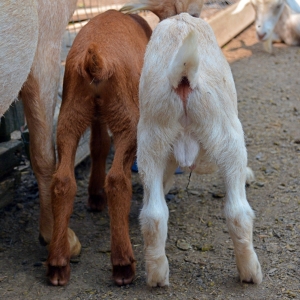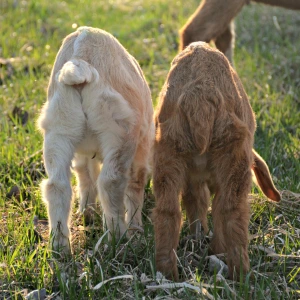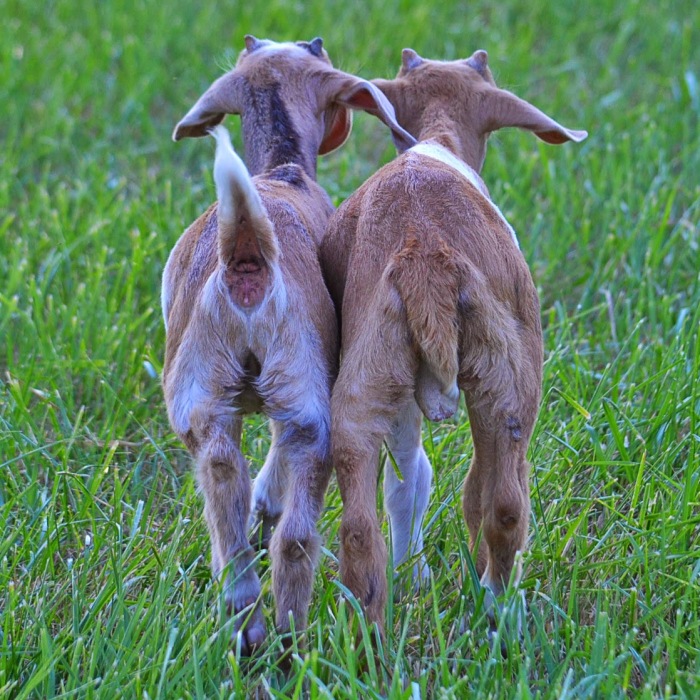The Situation
Remember, I was talking about the problems I have with worms being resistant to two of the three main chemical wormers available for goats and how this situation came to exist on my farm. If you haven’t read Part I, you can find it HERE.
Rotating Wormers
There are all kinds of theories to avoid resistance, and one I’ve known several people to practice is to rotate through the different classes/brands of wormer. The theory is that by rotating, it will take longer to develop resistance since they will be exposed to each class of wormer less frequently.
In reality, if you kill ninety percent of the worms with a pancour wormer, you have some that have been exposed to it still living and passing eggs to the rest of the herd. The next time you worm, you use an Ivermectin product, and now ten percent of those that survived before have now been exposed to both. It doesn’t seem like much, but it does compound the problem.
This means it will simply make the worms resistant to all the wormers as you progress. It might make it more difficult to know which resistant worm (or worms) is in each goat, so you end up with a game of Russian roulette, wondering if this is the wormer that will take care of the problem.
Sadly, this is what can also lead to that cycle of worming every two weeks when you get a goat that has gotten full of worms and run down and they continue to re-infest the goat. Even though vets will tell you to do this and rotate wormers as the only possible way to save a goat’s life, it does exacerbate the problem of drug resistance.
More Bad Advice
No matter whom you speak to, you get the advice to worm goats. It’s a vicious cycle. I already wormed them, and nothing works but Cydectin, but if I use Cydectin it will be ineffective within two years (according to one ISU vet). She suggested I send a big conglomerate of goat feces to them, and they will send it on to Georgia, where they will actually hatch the worm eggs and do testing to see which chemical wormer will most likely be effective. Well, that’s all well and good, but I have kids that could drop dead without any warning, and the time it takes to do that isn’t going to help. Also, I know the wormer it will tell me to use is Cydecitn (oh no, you can’t use that). Also, it won’t tell me which goat it won’t work on, so I’m really back to where I was before.
There has to be a way to tell if a wormer is effective or not without the goat drop dead or having to have a blood transfusion. There is. You take a fecal sample and send it to Iowa State for a McMaster’s fecal test. On the same day, you worm the goat. Ten days later, you get a fecal sample from the same goat and send to Iowa State for the same test. If 90% of the worms have been killed, then the wormer was effective. Okay, last I knew, it was $35 for that one fecal exam, so you’re at $70 plus either postage or driving the samples to Iowa State and the wormer. We’re at $80 or more, and that would have to be done for each kid. That means, with the forty-two kids I started with, it would cost over $3300. Not to mention, ten days is too long to wait if it isn’t working. They’ll be dead.
Then mention that it’s difficult to train goats to poop on command, and you get told that you have a finger. I’m not even going to mention how impractical and likely to cause injury that is on some smaller kids.
Complicating Matters
To make things even worse, for the first time this year, I’ve had kids that the wormer worked on, but they grew increasingly anemic and weak. The first kid I lost was Simon. I had wormed him, before he showed any signs, with the rest of the kids. A couple of days later, he had diarrhea, and I did a fecal. He had just a couple round worm eggs and a few coccidia. By all accounts, this shouldn’t make him sick, but it did. Keep in mind, that it requires a completely different wormer to treat coccidia.
Sadly, it was too late to help Simon, but a vitamin cocktail (B complex and A,D&E at 1cc each/20 pounds) and probiotics helped Art. He also got IV fluids subcutaneously. It helped but still left him dumpy. The reason they continued to decline even though I wormed them is probably because they already had a heavy load by the time I first wormed them.
Another factor is the coccidia. I never had coccidia in my goats until after the chemical wormers started failing on the roundworms. Because I didn’t know about the failure or this secondary invasion, the worms reproduced freely spreading eggs all through my soil. Coccidia are a secondary invader, taking advantage of a weak or sick animal. The presence of just those few can be enough to cause an already fragile goat to fail.
Herbal Wormer
Then, as soon as I say, “herbal wormer,” to a vet, I can hear the eye rolls through the phone. However, I started using the herbal wormer after I nearly lost Millie and Bam Bam because the chemical wormer only eliminates worms in one stage of the life cycle. That means it doesn’t take long before the goat can be filled just as badly as before they were wormed. You can end up in a cycle of worming every two weeks that still sees the animal failing and causing more problems with resistance.
That’s what was happening with Bam Bam (see Part I), and then I started him on the herbal wormer. He thrived from that point forward because the herbal wormer makes them an “inhospitable environment.” The worms won’t attach to the lining of their stomach and simply pass out of their body. You can actually see live worms in their feces if they are just getting started on the wormer.
Sadly, the herbal wormer is not a panacea, and because nobody has done studies, you’re pretty much on your own trying to figure out the fine details of using herbal wormer. It works very well for a nice healthy adult. Some times to watch a goat closely and be leery as to whether or not the herbal wormer is working:
- If a goat is not feeling well, it doesn’t work.
- I also have to watch and make sure each goat is getting their fair share. Like chickens, they have a pecking order, and not all goats get the same amount of food.
- I have some moms that are so busy trying to avoid their kids that are relentless in trying to nurse that they don’t get enough to eat.
- They have to have a fully functioning rumen. That means it is not effective on kids until they are about two months old. By this time, they can already be full of worms (Potsie/Simon).
What’s a Farmgirl to Do?
Thursday, I’ll give you my best advice from a lot of reading and consulting with my vet in the final installment of worm resistant drugs. Well, it will be the final installment until the worms change the rules on me again.
I promise no more poopy pictures for the Part III on Thursday.












































